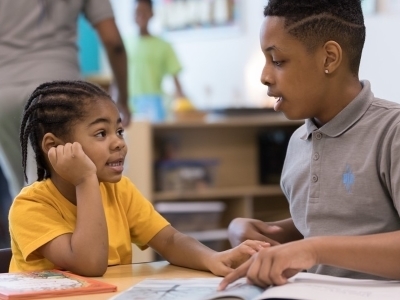Developing Replacement Behaviors for Traditional Measures
Topics

Educators are rethinking the purposes, forms, and nature of assessment. Beyond testing mastery of traditional content knowledge—an essential task, but not nearly sufficient—educators are designing assessment for learning as an integral part of the learning process.
Let's shift the conversation about test scores toward developing replacement behaviors that empower learners to regularly demonstrate their proficiency.
Test score season is upon us. A time when people celebrate or deflate based on what most admit is a narrow measure of whole learner development. Every year of my teaching career around this time, I was called into my principal’s office to discuss the embargoed standardized test scores from the previous years. It was a frustrating experience for both of us. For me, it was a post-mortem. Old data that wasn’t meaningful to the needs of my incoming students seemed of little value to me. For my principal, it was frustrating because whether 97 percent of my students hit the mark or 59 percent of my students were deemed proficient (both of which were true at different times), my response was always the same: “ok, thanks.” No high fives or patting myself on the back, and no instant depression and self-defeatism. The expectation that I would have an emotional response was always met with disappointment. I believed that by doing this, I could shift other people’s thinking about the value of a test score. I was wrong.
Engaging community experts to serve as mentors and critical feedback partners helps them to invest in schools while gaining a better understanding of how the school experience has changed since they were students.
Although I stand by my reaction and those same core beliefs, I would be remiss if I didn’t acknowledge the mistake I made in these interactions. I wanted people to place less value on standardized tests and other narrow measures of achievement, but I wasn’t doing much to change how parents, community members, and fellow educators defined success. My rejection of these entrenched beliefs enabled others to label me as being against the idea of setting expectations or standards for students—a common myth about personalized learning advocates.
I am still railing against the current system and believe we need redesign rather than reform. The difference today? I am committed to shifting the conversation through the development and communication of replacement behaviors that empower learners to regularly demonstrate their level of proficiency. So, what are those substitute behaviors?
1. Celebrations: Shifting what we celebrate at the state, district, school, and classroom level is the first step. I am not advocating for completely ignoring standardized test performance and traditional grades, but I am asking everyone to look at the weight you place on those measures of achievement. How do you recognize the skills, dispositions, and behaviors that we know are needed for success beyond school? Is there time at staff or board meetings, to highlight and encourage responsible risk-taking and innovation that yields promising results, but hasn’t quite reached the level of ‘best practice’ yet? When sharing, are we telling the whole story of what went well, what didn’t, and how we are dealing with the barriers? Unless we incentivize innovators and risk takers through positive recognition and consistent feedback, we are at best granting them passive permission to take a chance.
2. Communication: There are many aspects of communication that are relevant to this cause. We are focusing on engaging the community, engaging our students, and engaging our educators. The best way to do that early on is by sharing what we believe about learning and success in plain terms. Too often organizations hide behind regulations and requirements, rather than sticking their flag in the ground. If you believe that the system is fine as is, I am ok with that. We will disagree, but I can respect your choice. It’s when we sit on the fence or defer to the mysterious ‘they’ who outrank us, that we lose the hearts and minds of our stakeholders. Share who you are and how you are moving toward the greater vision frequently and consistently.
3. Resource allocation: When an organization or individual espouses a set of core beliefs, it is easy to see how aligned they are with those values by examining their use of resources. Shifting mindset requires that stakeholders feel supported in more than just financial terms. If we believe in personalized models of learning but invest in traditional programs designed to bring scores up, we are sending the message that we are not committed. A colleague of mine often says that the best organizations invest in people, not programs. That investment has an empowering ripple effect that will motivate educators and solidify your credibility amongst a wide range of stakeholders.
4. Measurement: We need to shift attention to measuring what matters by investing in better formative assessments that learners can leverage to co-create and self-select their path. We can also promote this refocusing through learner-led conferences, public exhibitions of student work, portfolio defenses, and regular presentations of learning that focus on where students are, what they need, and their plans for moving forward. My mecca for getting started here has been Share Your Learning. But this behavior shift shouldn’t just be for students. We are beginning to think about how these approaches could impact our professional learning and teacher evaluation structures as well. When people see what learners are working on, tangible progress of their work toward goals, and clear plans for their improvement, more traditional methods of measuring learning fade back into a place that honors them for what they are: one small piece of the puzzle.
Typically, we engage our community a few times a year through the release of test scores, quarterly report cards, and parent-teacher conferences that usually amount to teacher information-sharing sessions. If we expect people to shift their thinking around what learning and proficiency look like, we must give them a window into the classroom. With technology tools, this could mean leveraging your learning management system to share lesson plans, resources, and examples of student work. Online portfolios and Twitter feeds that share examples of students in action can offer a daily peek at the process of learning that we value so much. Engaging community experts to serve as mentors and critical feedback partners helps them to invest in schools while gaining a better understanding of how the school experience has changed since they were students.
My advice: Don’t apologize for stating and standing by your beliefs and values. Continue to rail against the system while providing the substitute behaviors that will systematically bring value to more accurate measures of learning. Being vocal comes with a responsibility to act. Whether you are a community member, parent, teacher, administrator, or school board member, it is up to you.




